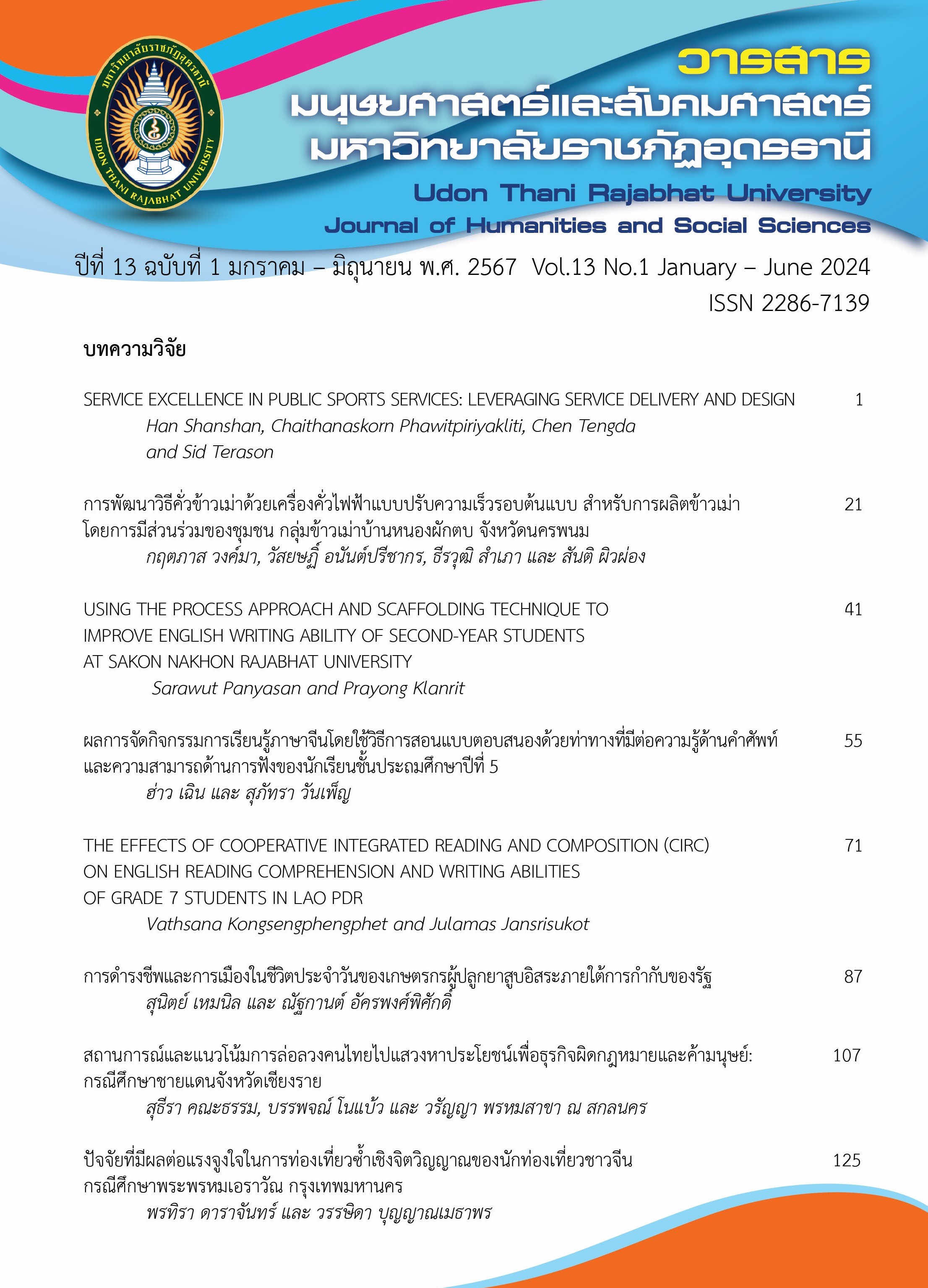USING THE PROCESS APPROACH AND SCAFFOLDING TECHNIQUE TO IMPROVE ENGLISH WRITING ABILITY OF SECOND-YEAR STUDENTS AT SAKON NAKHON RAJABHAT UNIVERSITY
Main Article Content
บทคัดย่อ
The purposes of this research were to study and compare the English writing ability of the second-year students before and after studying English writing using the process approach and scaffolding technique, and to investigate students’ attitude towards teaching English writing using the process approach and scaffolding technique of the second-year students. The sample consisted of 36 second-year students of the Bachelor of Arts Program in English under the Faculty of Humanities and Social Sciences, Sakon Nakhon Rajabhat University. They were selected using cluster random sampling. The research was experimental research with a one-group pretest-posttest design. Research instruments included 12 lesson plans, an English writing ability test, and an attitude questionnaire. The experiment lasted 12 weeks, 3 hours a week, 36 hours in total. The mean, percentage, standard deviation, one-sample t-test, and t-test for dependent samples were used for data analysis. The results were 1) The students’ pretest and posttest mean scores on English writing ability were 16.86 or 52.60 percent, and 25.28 or 78.99 percent respectively. The students’ posttest mean score on English writing ability was significantly higher than that of the pretest at the .01 level, and the mean score on the posttest was higher than the set criteria of 70 percent. 2) The students’ attitude towards teaching English writing using the process approach and scaffolding technique was at a good level.
Article Details
เอกสารอ้างอิง
Best, J. W. (1981). Research in education. 4th ed. Englewood Cliffs, NJ: Prentice-Hall.
Campbell, D. T., & Stanley, J. C. (1963). Experimental and quasi-experimental design for research. Boston: Houghton Mifflin.
Fry, E. B., Fountoukidis, D. L., & Kress, J. E. (2000). The reading teacher's book of lists. 4th ed. Wiley, John & Sons, Incorporated.
lamla-Ong, H. (2014). Language learning problems and language learning strategies of MFU students. MFU Connation: Journal of Humanities and Social Sciences, 3(1), 54-86.
Kirkpatrick, A. (2012). English as an Asian lingua franca: A lingua franca approach. Journal of English as a Lingua Franca, 1(1), 121–140.
Kongcharoen, P. (2017). The development of English writing ability using the process approach and scaffolding technique of the second-year students at Udon Thani Rajabhat University. Master Thesis in TESOL, Udon Thani Rajabhat University.
Likert, R. (1982). A Technique for the Measurement of Attitudes. Archives of Psychology, 140(8), 1-55.
Pawapatcharaudom, R. (2007). An investigation of Thai students’ English language problems and their learning strategies in the international program at Mahidol University. Master’s thesis, Faculty of Arts, King Mongkut’s Institute of Technology North Bangkok.
Sharifian, F. (2009). English as an International Language: Perspectives and Pedagogical Issues. Multilingual Matters.
Tompkins, G. E. (2004). Teaching writing: balancing product and process. Upper Saddle River, NJ: Merill/Prentice Hall.
Van de Pol J. E., Volman M. L. L., & Beishuizen J. J. (2010). Scaffolding in teacher-student interaction: a decade of Research. Educational Psychology Review, 22(3), 271-297.


